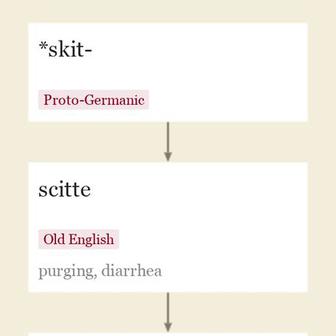shitty (adj.)
1924年,"被粪便污染的",来自 shit(n.)+ -y(2)。更早的形容词是 shitten。
shitty 的相关词汇

中古英语中的 shit “腹泻”,源自古英语中的 scitte “通便,腹泻”,源自 shit(动词)的词源。 “排泄物”的一般意义可追溯到16世纪80年代(古英语中有 scytel,中古英语中有 shitel,表示“粪便,排泄物”; 通常14世纪的男人或动物体内的自然排泄物的名词似乎是 turd 或 filth)。作为感叹词,1920年有印刷记录,但肯定更早。1508年开始用于“讨厌的人”; 1937年开始用于“不幸,麻烦”。
Shit-faced “喝醉了”是20世纪60年代学生俚语; shit list 是1942年的。Shitload(也是 shit-load)表示“很多”是在1970年之后。Shitticism 是罗伯特·弗罗斯特(Robert Frost)对粪便写作的说法。
Up shit creek “陷入麻烦”是1868年在南卡罗来纳州的背景下出现的(与其隐喻 salt river 相比,它可能是一个粗俗的变体)。俚语 not give a shit “不在乎”是在1922年开始使用的。悲观的表达方式 same shit different day 在1989年有记录。在1969年之后开始使用 get (one's) shit together “处理自己的事务”。强调的 shit out of luck 是在1942年之后出现的。
这个表达方式 when the shit hits the fan “暗指危机时刻或其灾难性后果”[OED]在1967年有记录。
The expression is related to, and may well derive from, an old joke. A man in a crowded bar needed to defecate but couldn't find a bathroom, so he went upstairs and used a hole in the floor. Returning, he found everyone had gone except the bartender, who was cowering behind the bar. When the man asked what had happened, the bartender replied, 'Where were you when the shit hit the fan?' [Hugh Rawson, "Wicked Words," 1989]
这个表达方式与一个古老的笑话有关,可能源自该笑话。一个人在拥挤的酒吧里需要排便,但找不到洗手间,于是他上楼,在地板上找到一个洞用了起来。回来时,他发现除了躲在吧台后面的酒保外,所有人都走了。当这个人问发生了什么事时,酒保回答说:“当粪便撞到风扇的时候,你在哪里?”[Hugh Rawson,《邪恶的词语》,1989]
"被粪便污染的",14世纪晚期,过去分词形容词来自 shit(动词)。从1540年代开始转义为"非常不愉快"。
形容词后缀,表示“充满或以...为特征”,源自古英语 -ig,来自原始日耳曼语 *-iga-(荷兰语、丹麦语、德语 -ig,哥特语 -egs 也有同源词),源自 PIE 语言的形容词后缀 -(i)ko-,与希腊语 -ikos 、拉丁语 -icus 中的元素同源(参见 -ic)。最初用于古英语中的名词; 从13世纪开始用于动词,到15世纪甚至用于其他形容词(例如 crispy)。像 hugy 、 vasty 这样的形容词是为了诗歌韵律而创造的人造词。